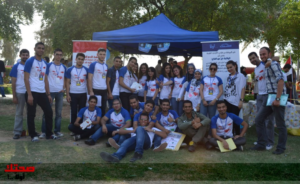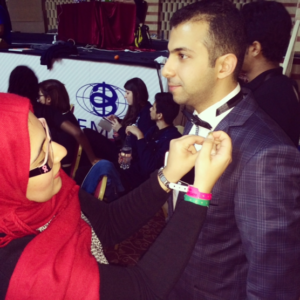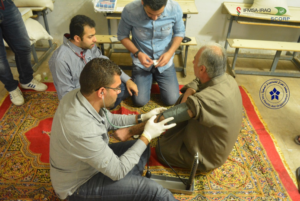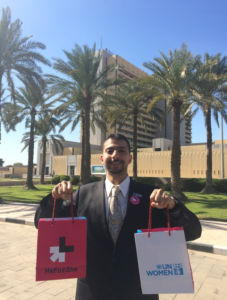“Iraqi Young Leaders Exchange Program.” The advertisement drew Marwan’s attention like a flame draws a moth. The piece of paper glued to the wall spoke of a six-week exchange program in the USA. When Marwan thought of the US, images of modern cities, prestigious universities and diversity came to mind. Marwan couldn’t think of a country that differed more to his own. “I knew it was going to change my life.”
In 2009, Marwan applied for the program along with thousands of other undergraduates from Iraq. Only 50 undergraduates were selected to join. A few months later, he found himself at the University of Massachusetts, learning about leadership and public policy.

Marwan at the Iraqi Young Leaders Exchange program, 2010, University of Massachusetts, USA.
“When I went back to Baghdad, I suffered from reverse culture shock. Iraq was just coming out of the civil war, and freedom of speech was pretty much non-existent. Despite this, our student cohort wanted to translate what we had learnt in the USA into activities.”
Marwan and his colleagues started small. They launched a program called ‘Your Health First’, which consisted of setting up a tent in a public park and measuring people’s blood pressure and body mass index to raise awareness around obesity and hypertension. When words of thanks flooded the tent, they decided to set up every weekend. The project grew quickly and in 2012 they formalised their efforts.

‘Your Health First’ tent, 2012, Al-Azawraa National Park, Baghdad.
At the time, Iraq was not part of the International Federation of Medical Students’ Associations (IFMSA). With no support, Marwan and his friends took initiative and travelled to the USA once again to attend the IFMSA’s General Assembly. “Everyone was wondering whether Iraq even had a medical school.” In August 2013, Marwan and his friends incorporated Iraq to IFMSA and formed (IFMSA-Iraq)

First presence of Iraq at IFMSA General Assembly, March 2013, Baltimore, USA
“We got motivated and started establishing many committees around public health, medical education, Reproductive health/AIDS, human rights and peace. We saw IFMSA-Iraq as a leadership school, with a handcrafted bylaw and constitution that met both Iraqi and international standards.”
In 2014 Marwan lead the first official IFMSA-Iraq delegation to Tunisia, to attend March General Assembly of IFMSA. In that meeting, they were awarded full membership with voting rights granted in March 2015.

Marwan getting IFMSA pin as founder and first elected president of IFMSA-Iraq. March 2014, Tunisia
Over the course of five years, a five-person volunteer-run organisation that had started with a tent in the park had suddenly become the most prominent student association in the Middle East, with over a thousand members. Other University Faculties looked to IFMSA-Iraq as a model to establish their own student-run organisations. Their impact extended beyond University walls. Medical students began helping internally displaced people in the community access hospitals, medical attention and medication.

Marwan and his IFMSA-Iraq fellow cooperating with other organizations to provide urgent medical care to internally displaced people who fled ISIS, 2015, Baghdad outskirts.
Marwan’s love for medicine did not stop at IFMSA-Iraq. He worked closely with the newly established medical education unit at the University of Baghdad/College of Medicine. The medical education unit collaborated with the University of Nottingham and University of Sheffield to upgrade the medical curriculum. For his efforts, Marwan was awarded the University of Baghdad and Sheffield Shields.
Despite their good works, the group faced opposition. Some local political parties did not like the fact that the organisation accepted people of all religions, political affiliations and gender. IFMSA-Iraq was the first organisation in Baghdad to have a Committee of Reproductive Health and AIDS led by a woman. They also ran awareness campaigns on breast cancer, cervical cancer and female genital mutilation a taboo subject in the region.

Marwan Volunteering in organizing HeForShe event in Iraq, coordinated by UN WOMEN, 2015, International Zone, Baghdad.
As ISIS’ presence grew in Iraq, the religious and political freedoms IFMSA-Iraq adopted were seen as a threat. In 2014, two Christian female friends were forced to leave the country. Three male friends soon followed. 2015 was an ominous year for Marwan.
Marwan originally came to Australia as a visitor with plans to catch up with friends he had met overseas. At that point, he needed to reassess his future as Iraq was no longer safe for him. Spending time with local surgeons in Melbourne reminded him of his passion for surgery and in particular, O&G.
“I loved being in theatre. When I finished medical school, surgery is what I wanted to do. I loved rotating in O&G because it had a beautiful balance between medicine and surgery, but there are significant cultural constraints around the specialty, especially in my country. Many women refuse to be examined by male O&Gs. I want to stand against this and other gender misconceptions in the specialty with my work.”
Marwan’s friends encouraged him to pursue O&G as a specialty, so he decided to study for the AMC exam to validate his international training. He passed the test in 2017 and got a job offer in Victoria. He is now working at Mater Mothers’ and Babies hospital, South Brisbane and enrolled in the RANZCOG Diploma.
In the future, Marwan wants to strengthen the bonds between Australia and the Middle East, like he once did between the US and Iraq.
“I believe RANZCOG has a lot to contribute in terms of improving women’s health, not only in Australia and New Zealand but abroad. And the Middle East has marvellous human power that can be used if channelled well. It can be a powerful centre of peace in the region. I am looking forward to FIGO in 2021 to see how we can start creating those relationships.”



